International Development
MicroMasters® Program in Data, Economics, and Design of Policy
Learn to evaluate the effectiveness of policies that tackle the most pressing problems facing low to middle income countries across the globe. Access Nobel Prize winning research and methodologies for alleviating global poverty, with courses taught by development economics pioneers Esther Duflo and Abhijit Banerjee.
Online courses for evidence-based problem-solvers
Take five Data, Economics, and Design of Policy (DEDP) courses and their corresponding proctored exams in any sequence to complete the International Development MicroMasters Program Credential in DEDP.
- Learn from Nobel-prize winning faculty from MIT Economics Department, ranked #1 in the world
- Access content for free or pay a fee to take the proctored exam and earn a course certificate
- Each course costs between $250 USD - $1,000 USD, depending on your income and ability to pay
- Take one course, or complete the entire program to earn a MicroMasters credential that counts as credit toward an in-person MIT Master’s degree (upon acceptance)
- Consider choosing the Public Policy Track and learn to evaluate the effectiveness of policies that tackle issues facing the US and other high-income economies.
Microeconomics
Use economic models to learn how prices and markets benefit society in the face of scarcity.
- START DATES:January 20, 2026
- DURATION:Approx. 11 weeks
- FORMAT:Online
- PRICE:$250-1000 USD
dependent on household income Need financial assistance?
Designing and Running Randomized Evaluations
Gain the practical skills for running evaluations in the field, learn the foundations of randomizations and research design, and get practical insights on how to collect high quality, reliable data in the field.
- START DATES:Fall 2026
- DURATION:Approx. 12 weeks
- FORMAT:Online
- PRICE:$250-1000 USD
dependent on household income Need financial assistance?
Data Analysis for Social Scientists
Learn methods for harnessing and analyzing data to answer questions of cultural, social, economic, and policy interest.
- START DATES:January 20, 2026
- DURATION:Approx. 11 weeks
- FORMAT:Online
- PRICE:$250-1000 USD
dependent on household income Need financial assistance?
The Challenges of Global Poverty (Intro)
A course for those who are interested in the challenge posed by massive and persistent world poverty.
- START DATES:January 20, 2026
- DURATION:Approx. 11 weeks
- FORMAT:Online
- PRICE:$250-1000 USD
dependent on household income Need financial assistance?
Foundations of Development Policy: Advanced Development Economics (Advanced)
Examine the different facets of human development, including education, health, gender, the family, land relations, risk, informal and formal norms, public policy, and institutions. At the same time, discover modern empirical methods in economics and gain experience working with real data and using software for statistical analysis.
- START DATES:May 12, 2026
- DURATION:Approx. 11 weeks
- FORMAT:Online
- PRICE:$250-1000 USD
dependent on household income Need financial assistance?
Political Economy and Economic Development (Advanced)
Explore why and how political institutions affect economic development, and apply key theories and empirical techniques to real-world examples ranging from voting and corruption to the role of the media.
- START DATES:May 12, 2026
- DURATION:Approx. 11 weeks
- FORMAT:Online
- PRICE:$250-1000 USD
dependent on household income Need financial assistance?
Faculty Instructors
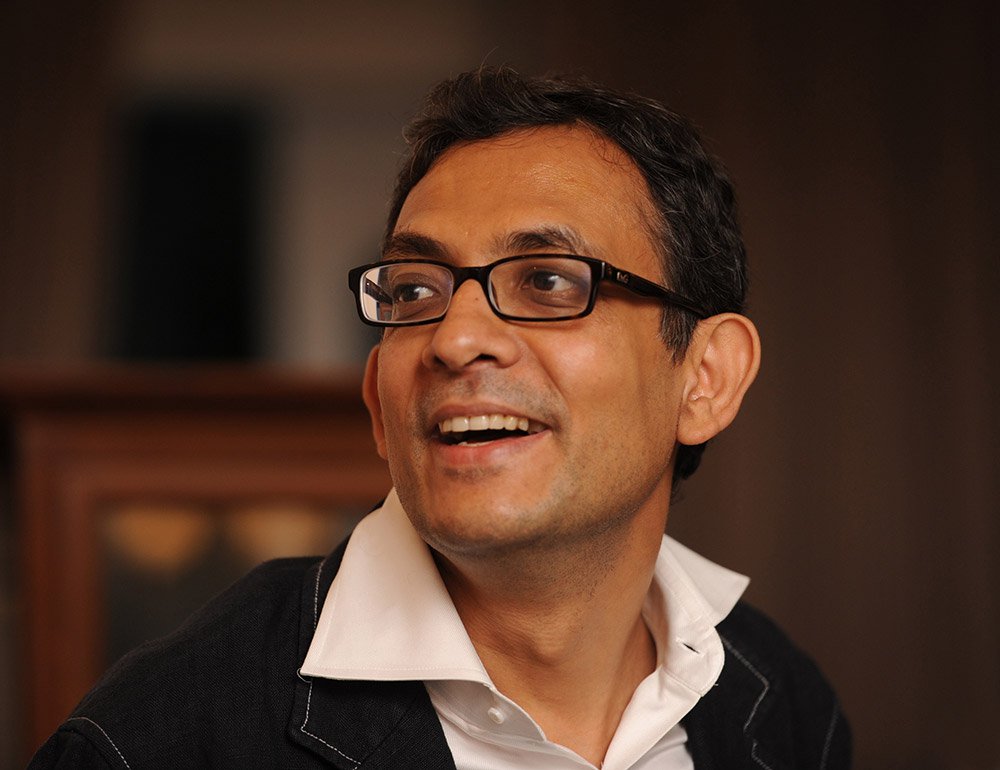
Abhijit Vinayak Banerjee
Abhijit Banerjee is the winner of the 2019 Nobel Prize in Economic Sciences. He was educated at the University of Calcutta, Jawaharlal Nehru University, and Harvard University.
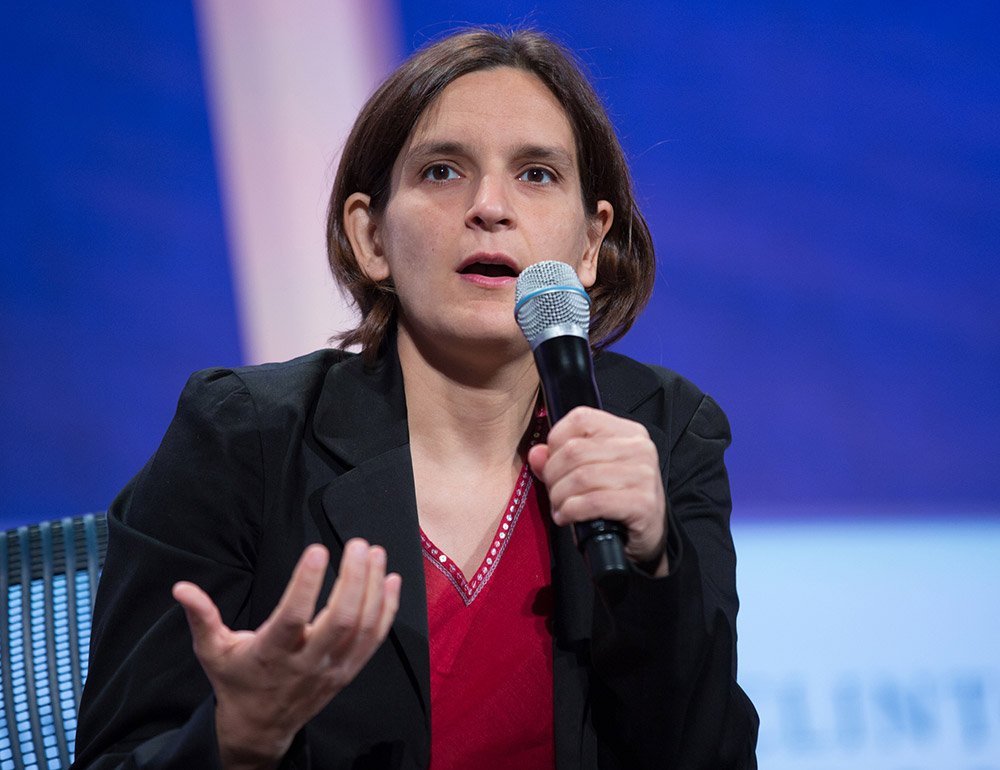
Esther Duflo
Esther Duflo is the winner of the 2019 Nobel Prize in Economic Sciences. She is also the Abdul Latif Jameel Professor of Poverty Alleviation and Development Economics in the Department of Economics at MIT.
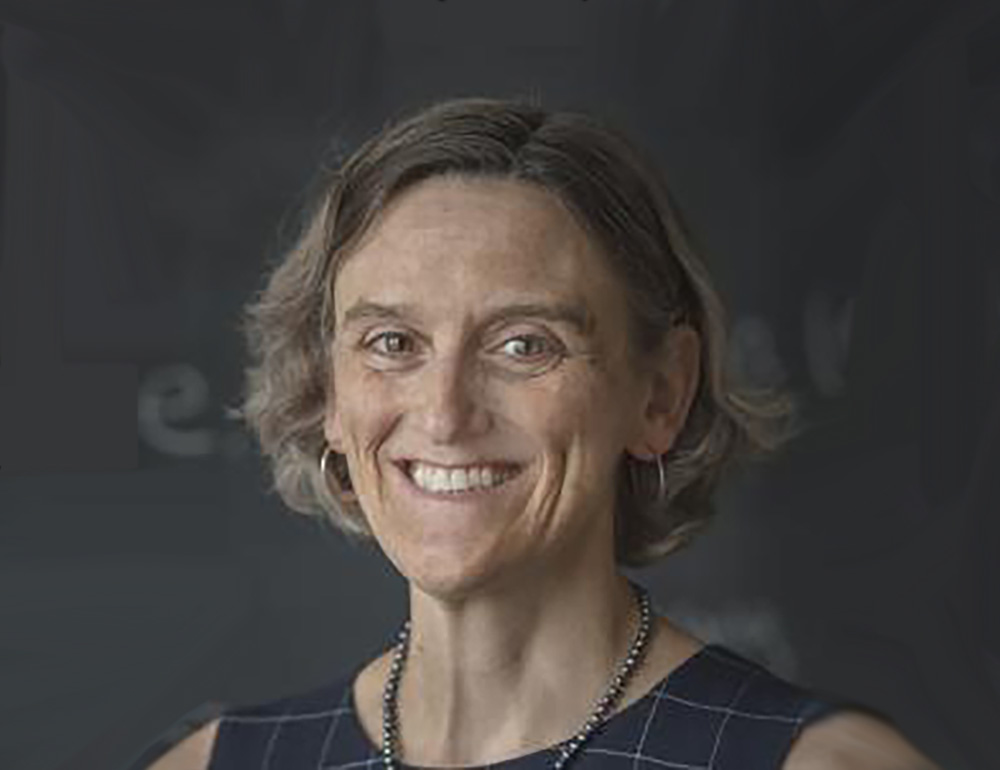
Sara Fisher Ellison
Sara Fisher Ellison is a Senior Lecturer in the MIT Economics Department. She was an undergraduate at Purdue University and received graduate degrees from both Cambridge University and MIT.
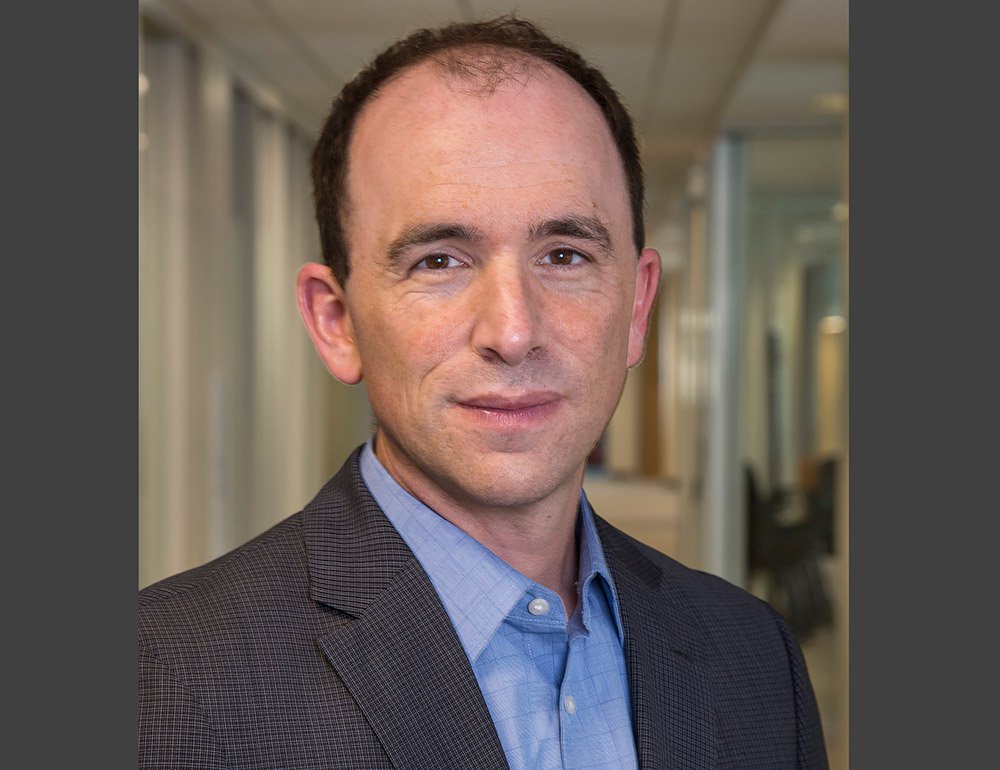
Benjamin Olken
Benjamin Olken is a Professor of Economics at MIT. His research focuses on political economy and public sector issues in developing countries, with a particular interest in corruption.
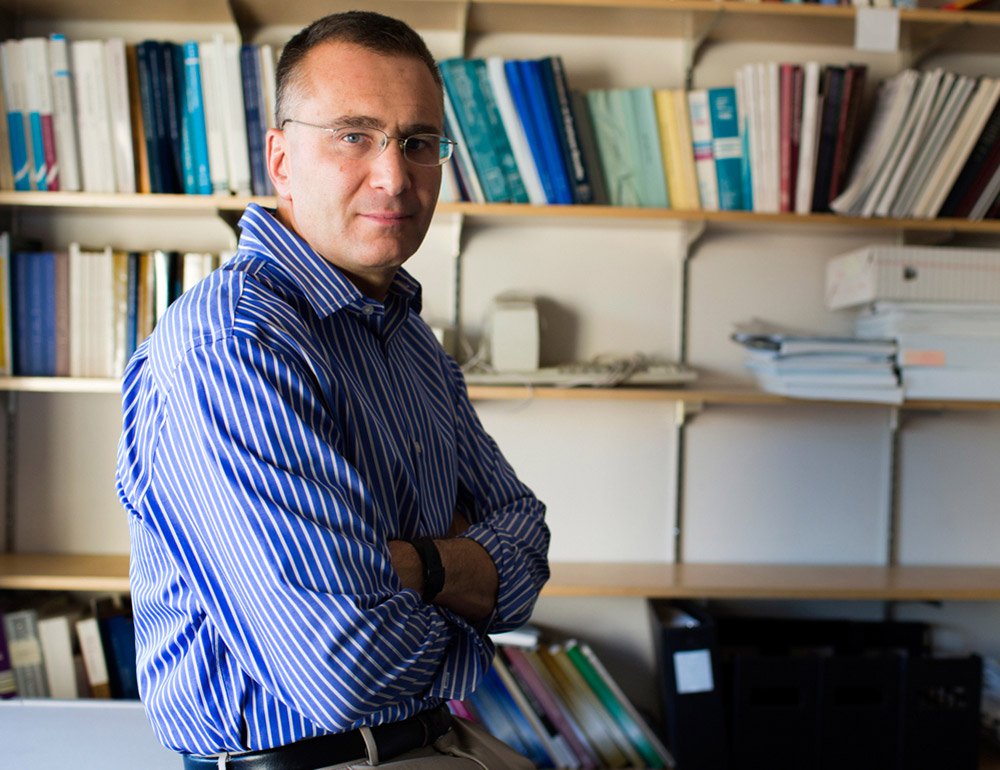
Jonathan Gruber
Dr. Jonathan Gruber is the Ford Professor of Economics at the Massachusetts Institute of Technology, where he has taught since 1992.
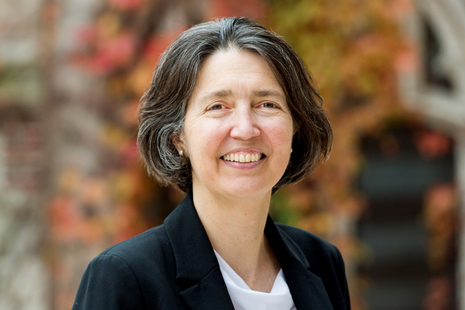
Rachel Glennerster
Rachel Glennerster is an associate professor of economics in the Division of Social Science at the University of Chicago. She is also an affiliated professor and former Executive Director of the Abdul Latif Jameel Poverty Action Lab (J-PAL).
Abhijit Banerjee is the winner of the 2019 Nobel Prize in Economic Sciences. He was educated at the University of Calcutta, Jawaharlal Nehru University, and Harvard University. He is currently the Ford Foundation International Professor of Economics at MIT. Banerjee is a past president of the Bureau for Research in the Economic Analysis of Development, a fellow of the American Academy of Arts and Sciences and the Econometric Society, and has been a Guggenheim Fellow and an Alfred P. Sloan Fellow. He is the recipient of many awards, including the inaugural Infosys Prize in 2009, and has been an honorary advisor to many organizations including the World Bank and the government of India.
Esther Duflo is the winner of the 2019 Nobel Prize in Economic Sciences. She is also the Abdul Latif Jameel Professor of Poverty Alleviation and Development Economics in the Department of Economics at MIT. She was educated at the Ecole Normale Supérieure, in Paris, and at MIT. She has received numerous honors and prizes including a John Bates Clark Medal for the best American economist under 40 in 2010, a MacArthur “Genius” Fellowship in 2009. She was recognized as one of the best eight young economists by The Economist magazine, one of the 100 most influential thinkers by Foreign Policy since the list exists, and one of the “Forty under 40” most influential business leaders under forty by Fortune magazine in 2010.
Sara Fisher Ellison is a Senior Lecturer in the MIT Economics Department. She was an undergraduate at Purdue University and received graduate degrees from both Cambridge University and MIT. She has been a fellow at both the Institute for Advanced Study and the Hoover Institute. Her recent research has investigated a number of questions in industrial organization, with a focus on the pharmaceutical industry and ecommerce. She serves on a number of editorial boards. She has taught at the undergraduate, MBA, and Ph.D. levels, and has received awards for both outstanding teaching and pedagogical innovation.
Benjamin Olken is a Professor of Economics at MIT. His research focuses on political economy and public sector issues in developing countries, with a particular interest in corruption. He is a faculty Director of the Abdul Latif Jameel Poverty Action Lab at MIT, Co-Scientific Director of the Lab’s Southeast Asia office in Jakarta, and Co-Chair of the Lab’s Governance Initiative. Olken received his BA _summa cum laude _as a double-major in Mathematics and Ethics, Politics, and Economics from Yale University in 1997, and his Ph.D. in Economics from Harvard University in 2004. In 1997-1998 he was a Henry Luce Scholar, living in Jakarta, Indonesia. He joined the MIT faculty as a tenured faculty member in 2008, directly after a three-year term as a Junior Fellow of the Harvard Society of Fellows and a one-year post-doctoral fellowship at the NBER.
Dr. Jonathan Gruber is the Ford Professor of Economics at the Massachusetts Institute of Technology, where he has taught since 1992. He is also the Director of the Health Care Program at the National Bureau of Economic Research, where he is a Research Associate, and President of the American Society of Health Economists. He is a member of the Institute of Medicine, the American Academy of Arts and Sciences, and the National Academy of Social Insurance. He has published more than 150 research articles, has edited six research volumes, and is the author of Public Finance and Public Policy, a leading undergraduate text, and Health Care Reform, a graphic novel. In 2006 he received the American Society of Health Economists Inaugural Medal for the best health economist in the nation aged 40 and under.
Rachel Glennerster is an associate professor of economics in the Division of Social Science at the University of Chicago. She is also an affiliated professor and former Executive Director of the Abdul Latif Jameel Poverty Action Lab (J-PAL). She uses randomized trials to study democracy and accountability, health, education, microfinance, and women’s empowerment mainly in West Africa and South Asia. She has also written on strategies to stimulate innovation, promoting more equitable access to vaccines, and the response to Ebola and COVID-19 pandemics.
After These Courses, You Will Be Able to
Understand the fundamentals of microeconomics, development economics, probability, and statistics
Identify and analyze the root causes of underdevelopment using principles of economics
Consider the unique constraints and trade-offs the poor face when making decisions
Interpret the findings of empirical research that evaluates the effectiveness of anti-poverty strategies, policies, and interventions
Design and implement rigorous randomized evaluations and other econometric methods of evaluating policies and programs
Conduct comparative cost-effectiveness analysis for informed policy-making
Hands-on skills in data analysis using the R programming language
Pursue a career in International Development/Economics
How the MicroMasters Program Works
Earning a MicroMasters program credential makes you eligible to apply to MIT’s Master's program in Data, Economics, and Design of Policy or other participating global pathway programs. If accepted, students will earn MIT credit for the MicroMasters program courses, and will be able to pursue an accelerated on-campus Master’s degree at MIT.
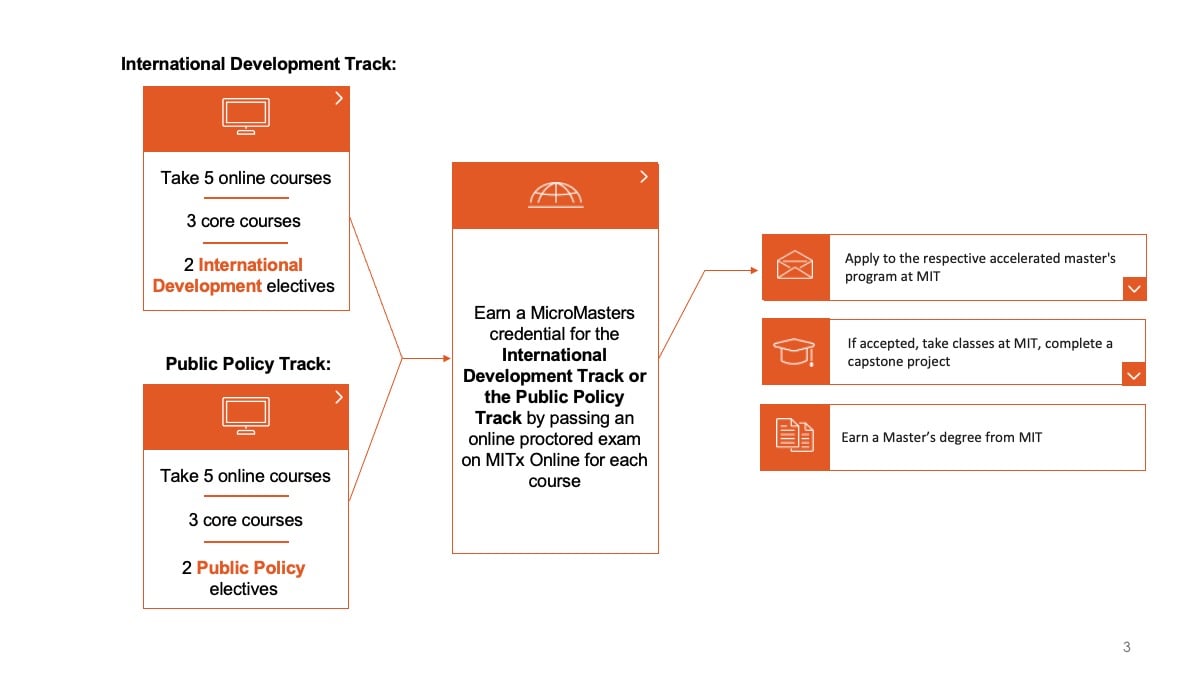
Whether you choose the International Development Track or the Public Policy Track, your five DEDP courses can be taken in any sequence. Earning a MicroMasters Program credential in DEDP also makes you eligible for a number of exclusive benefits, including affiliate MIT Alumni Association membership.
These courses are for you if
- You are a policymaker or practitioner from a government, NGO, international aid agency, foundation, or other entity in the development sector
- You are an academic or evaluator looking to re-tool and apply data-driven perspectives to social and development programs
- You are a student interested in pursuing admissions to graduate programs in development economics, public policy, political science, or related fields
- You are a social entrepreneur, manager or researcher in the development sector
- You want to pursue a career in International Development
- If you are interested in issues facing the US and other high-income economies, consider pursuing the Public Policy Track
What learners are saying

Xu, Business Manager (China)
"The knowledge I gained from this program made me realize the importance of delving into the reasons behind a country’s policies. We all need to think independently to make better political decisions. And this program provided me the fundamental knowledge on how to do that."
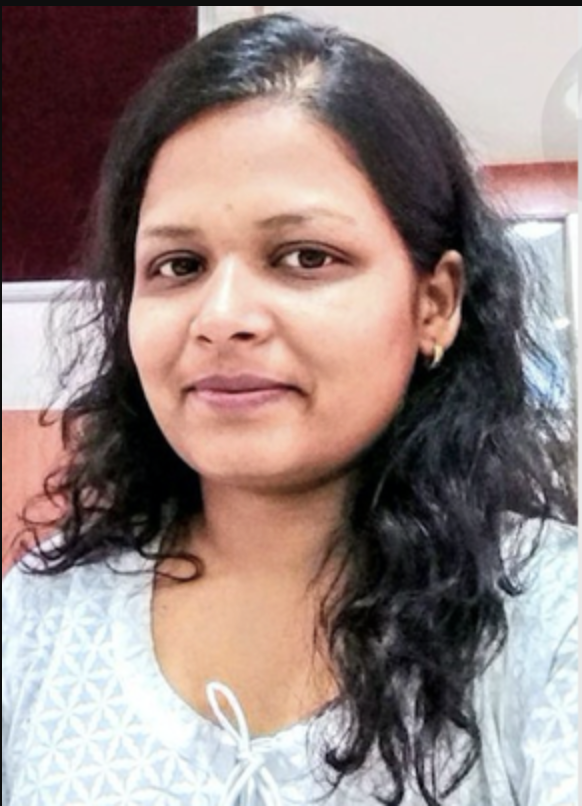
Pallavi, Ministry of Rural Development (India)
"Overall, MicroMasters is enabling me in achieving my dream of contributing to the development economics and public policy."
.jpg?width=1917&height=1918&name=Leena%20(MENA).jpg)
Leena, Teach for Qatar (Sudan)
"The DEDP program is the perfect opportunity to grow further in the skills necessary to work better with data and to understand the role that good data plays in driving decisions at a policy level."
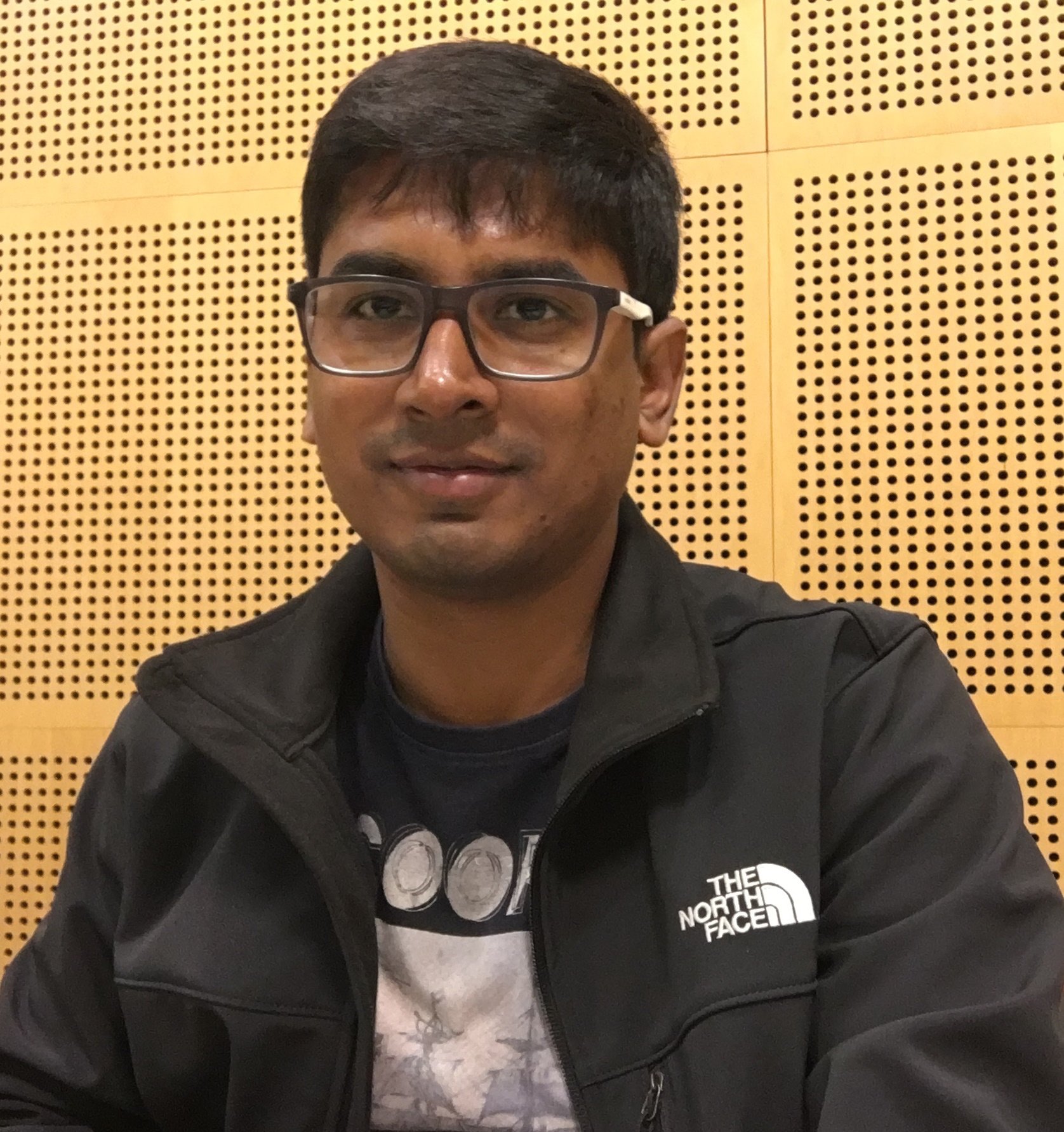
Kundan, Jharkhand State Livelihood Promotion Society (India)
"What motivated me to join the MicroMasters program was the way the course curriculum is designed and that the courses were being presented by some of the most esteemed personalities of the development sector."
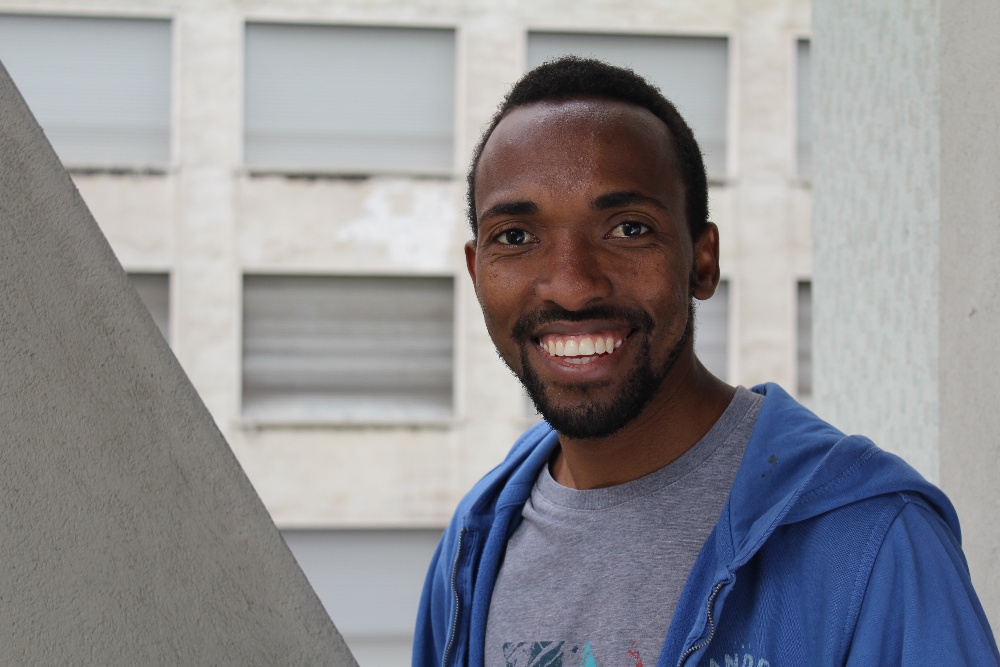
Elie, Student at Universita Cattolica del Sacro Cuore (Burundi)
"In this MicroMasters, improving the lives of the poor remains at the centre of learning, and this is at the centre of my purpose."

Diana, Consultant (Romania)
"The knowledge gained [in this program] should help me make a more active contribution to the field of evidence based policies and programs here in Romania, a field which has not yet been explored."







